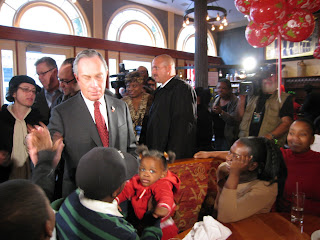
HE is Bloomy in the wonderful, wicked world of tabloid headlines.
“Bloomy Blasts Immigration Critics in China Speech”: That’s New York City Mayor Michael R. Bloomberg being referred to by the New York Post when the daily reported about his trip to Shanghai a fortnight ago.
Two months ago, a news story pointed out that Bloomberg, a green advocate, is ironically a big producer of carbon dioxide himself through his constant travel by plane as well as his ownership of several cars and houses.
The heading? “Bloomy Amasses Gas”.
(Although he reportedly takes the subway to work, a reporter who once “spied” on him for five weeks observed that he took the mass transit only about twice weekly.)
Founder of the Bloomberg LP financial news service, Bloomberg is a billionaire who took over as mayor about three months after the Sept 11 tragedy.
He has, by many accounts, done a number of things right for the city of eight million people although New York isn’t always running high on optimism.
“I don’t see much difference, actually. He has even lowered the standard of schools to make their performances look better,” said native New Yorker Elizabeth Barton, an advocate of better living standard for the public.
Neither was she happy with what she saw as neglect of the police department despite its tag as “New York’s Finest.”
“Their starting annual salary is US$25,000. They are among the lowest paid. We are losing many officers to other counties like Nassau and Suffolk,” she said.
Her efforts to contact Bloomberg’s office several times to raise the issue came to naught, she said.
To her, former mayor Rudy Giuliani made a bigger impact on New York although she personally found him arrogant.
“He was very strict on crime. He cleaned up the city,” she said.
Bloomberg’s intention to introduce a congestion pricing where motorists would be charged a fee for using bottleneck areas during peak hours was rather unpopular too.
But Barton acknowledged her approval for Bloomberg’s no-smoking law in restaurants and bars, his tough stance against illegal guns, and the ban on artificial trans fats in all eateries by July 2008.
Others applaud his plans for a Green Apple that call for the planting of one million trees within 10 years, besides adding more parks in the city.
“At the end of the day, he has done quite a good job,” said Lotus Chau who, as chief reporter of Sing Tao Daily, has covered City Hall for the past 10 years.
She described him as efficient although she felt that Giuliani was a tougher mayor.
Last week, Bloomberg held a holiday reception for the press corps at Gracie Mansion, the mayor’s official residence which is now used mostly for public functions as he doesn’t live there, opting to stay at his own townhouse.
He joked with the press, besides telling them to continue asking questions that would keep the administration going.
On Christmas Eve, he appeared at City Hall Restaurant where the homeless were served lunch. Bloomberg, a divorcee with two daughters, shared with reporters his Christmas plans with his girlfriend.
When a journalist from Univision, the biggest Spanish TV network in the United States, asked him to offer a Christmas greeting in Spanish, Bloomberg readily obliged.
“His command of the language is quite okay,” said the journalist.
The mayor, who has a weekly radio address that touches on all things New York, has apparently bought a US$45mil townhouse which would act as the headquarters of a foundation that would be part of his philanthropic works once he leaves office in 2009.
Still, talk is swirling whether the 65-year-old Bloomberg would run for president especially when he quit the Republican Party in June, giving credence to speculation that he would battle it out as an independent contender.
He steadfastly denied such talk, saying that he would complete his second term as mayor. The speculation, however, has not died down.
“I don’t think he would run for president. He’s too wealthy and too smart to do so,” political analyst Ari Fleischer told foreign journalists recently.
After all, Time magazine declared him one of America’s five best mayors last year.


